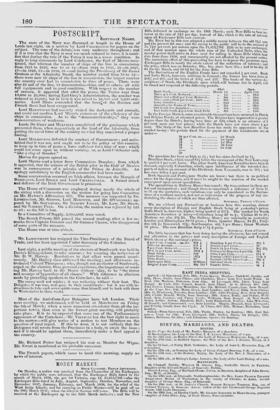POSTSCRIPT
SATURDAY NIGHT.
The state of the Navy was discussed at length in the House of Lords last night, on a motion by Lord CoLenEsr En for papers on the subject. The tone of the debate,was very moderate throughout ; and if it is true that the Navy is now too much reduced in 'force, it is mani- fest that during the rule of the Tories it was in a woise condition. In reply to long statements by Lord Colchester, the Earl of MINT() men- tioned, that whereas the number of ships of the line in commission from 1821 to 1823, was 10 or 12—from 1824 to 1826, 16—in 1827, 17—in 1828, 15—in 1830, 18—and during the Presidency of Sir James Graham at the Admiralty Board, the number varied from 10 to 12— there were now 19 ships of the line in commission, the largest number the country ever had in commission in time of peace. There were also 21 sail of the line, 13 demonstration-ships, and 26 others, all with full equipments and in good condition. With respect to the number of seamen, it appeared that after the peace, the Tories kept from 13,000 to 21,000; during Earl Grey's Administration, the number was reduced to 18,000; but in 1826 it was raised to 22,5(11) and 2,200 ordi- naries. Lord .Minto contended that the ibree; of the Russian and French fleets had been exaggerated.
Lord HanowIcten had recently visited the dockyards and arsenals, and could not confirm Lord 31into's statement of the efficiency- of the ships in commission. As to the "demonstration-ships," they were demonstrations of weakness.
Lords DE GREY and MELYILLs: complained of the parsimony which prevented therm when respectively at the head of the Admiralty, from putting the naval force of the country on what they considered a proper footing.
Lord MELTIOUESE defended the conduct of Government; and main- tained that it was not, and ought not to be the policy of this country, to keep up in time of peace a force sufficient for a time of war ; which could not come upon us without warning, or, as Lord Colchester said, "like a clap of thunder."
Mothm for papers agreed to.
Lord MINTO read a letter from Commodore Douglas; from which it appeared, that the seizure of the British pilot in the Gulf of Mexico was in consequence of a mistake of the Prince de Joinville. An apology satisfactory to the English commander had been made.
Some conversation occurred on Irish affairs, between the Marquis of NORMANSY, Lord RoDEN and Lord CHARLEv1LLE. A formal attack and defence of the Irish Government is promised.
The House of Commons was employed during nearly the whole of the sitting with a discussion on the motion for going into Committee on Mr. HavvEs's Affirmation Bill. The measure was supported by Dr. LufiniNcaos, Mr. Ginsox, Lord Monitssrfr, and Mr. O'CONNELL ; op- posed by Mr. Commas:, Sir Romer Isom s, Mr. Law, Mr. SHAW, and Sir Romer PEEL. On a division, the motion was rejected by 125 .to 93: so the bill is lost.
In a Committee of Supply, 2,000,0001. were voted.
The Scotch Prisons Bill passed the second reading, after a few re- Marks from Captain Gonnox and Sir GEORGE CLERK, who disapproved of some parts of the measure.
The House rose at nine o'clock.


























 Previous page
Previous page